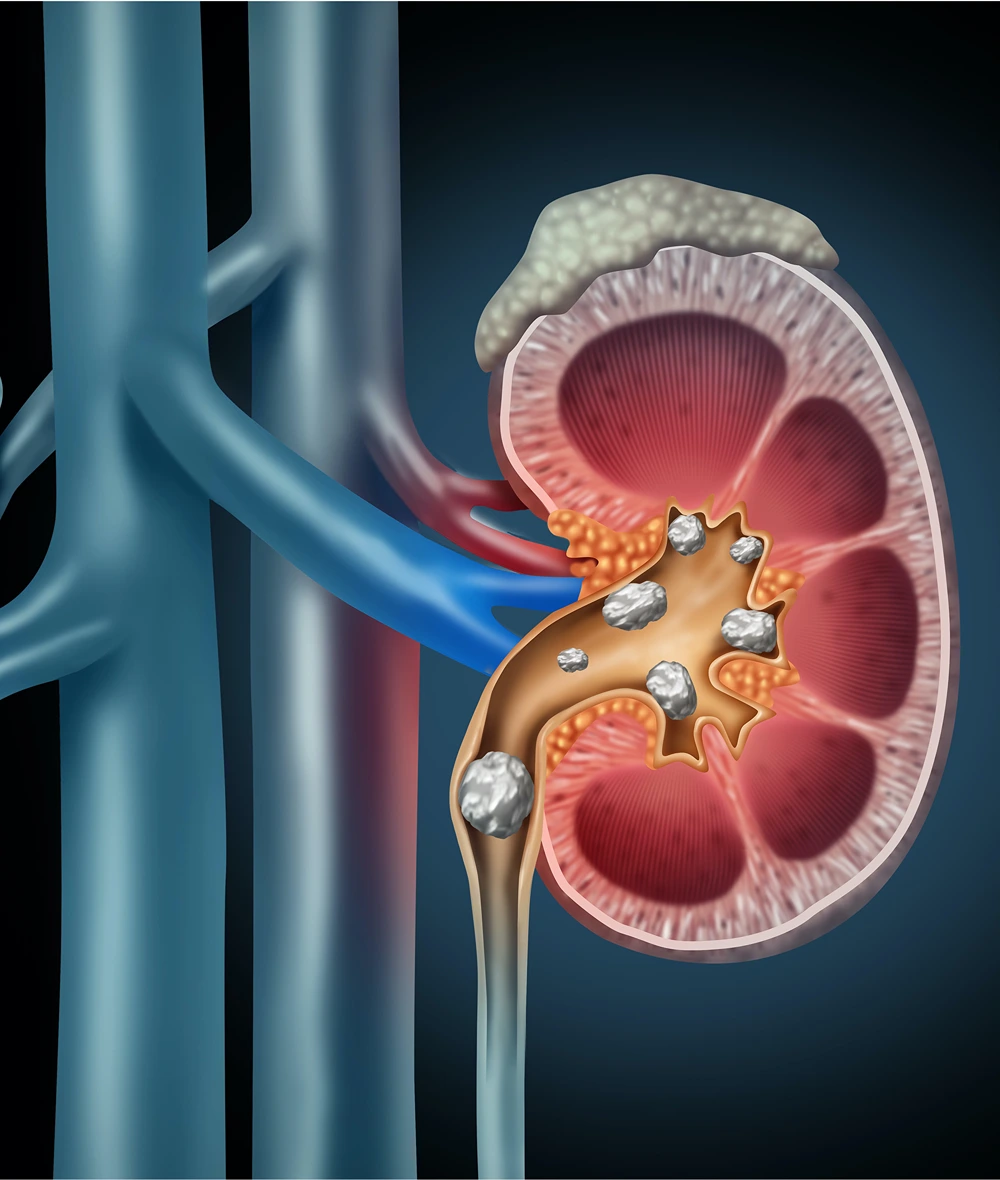Understanding Kidney Stones
Causes and Treatments Explained
Discover the underlying causes of kidney stones and explore effective treatment methods to manage and prevent them.
General Causes of Kidney Stones
Understanding the Causes
Introduction: Kidney stones affect millions globally, causing intense pain as they pass through the urinary tract. Understanding the causes, particularly in men, is key to prevention and effective treatment.
What Causes Kidney Stones?
- Dietary Factors: High intake of oxalate, sodium, or protein can lead to stone formation. Foods like spinach, nuts, and chocolate raise oxalate levels in urine, while excessive sodium increases calcium excretion, forming calcium-based stones.
- Dehydration: Low fluid intake results in concentrated urine, which facilitates the crystallization of minerals like calcium and uric acid, primary components of kidney stones.
- Medical Conditions: Conditions such as hyperparathyroidism, gout, and urinary tract infections (UTIs) can increase stone risk by altering urine composition or flow.
- Genetic Factors: A family history of kidney stones can predispose individuals, with genetic factors affecting mineral metabolism.
- Lifestyle Factors: Sedentary habits and obesity disrupt metabolic processes, increasing the urinary excretion of stone-forming substances and the risk of kidney stones.

Kidney Stones in Men
Unique Causes and Considerations
Men are more likely to develop kidney stones due to factors such as higher dietary intake of protein and salt, as well as lower fluid intake. Hormonal differences and lifestyle choices also play a significant role. Recognizing these unique causes can help tailor more effective treatment plans for men.
While the general causes of kidney stones apply to both men and women, several factors specifically contribute to kidney stone formation in men:
- Higher Protein Intake: Men typically consume more protein than women, increasing uric acid excretion and the risk of uric acid stone formation.
- Increased Risk of Gout: Men are more prone to gout, a type of arthritis caused by uric acid crystal accumulation in the joints. Elevated uric acid levels from gout can also lead to uric acid kidney stones.
- Occupational Factors: Jobs involving prolonged physical exertion or high temperatures may increase kidney stone risk in men due to dehydration from sweating and inadequate fluid intake.
- Higher Alcohol Consumption: Men tend to consume more alcohol than women, and excessive intake can lead to dehydration, raising the risk of uric acid stone formation.
Comprehensive Treatment Options
Effective Methods for Treating Kidney Stones
At Max Stone & Surgical Center, we offer a range of treatment options tailored to the specific needs of our patients. Non-surgical methods include Extracorporeal Shock Wave Lithotripsy (ESWL), which uses sound waves to break up stones, and medical therapy to help dissolve certain types of stones. For more complex cases, surgical options such as ureteroscopy, percutaneous nephrolithotomy, and laparoscopic surgery are available. Our team of experts will work with you to determine the most effective treatment plan to ensure a swift and successful recovery.
Managing kidney stones involves various approaches to alleviate symptoms, prevent recurrence, and facilitate stone passage. Treatment options include:
- Pain Management: Severe pain from kidney stones is often treated with analgesic medications, such as nonsteroidal anti-inflammatory drugs (NSAIDs) or opioids.
- Hydration: Adequate fluid intake is crucial for preventing kidney stones. Increasing water consumption helps dilute urine and reduce the concentration of stone-forming substances.
- Medication: Depending on the stone type, medications may be prescribed to prevent formation or facilitate passage. These can include diuretics, alkalinizing agents, or inhibitors of stone-forming substances.
- Extracorporeal Shock Wave Lithotripsy (ESWL): ESWL is a non-invasive procedure that uses shock waves to break large stones into smaller fragments, making them easier to pass through the urinary tract.
- Surgical Intervention: For stones too large to pass naturally or causing complications like urinary obstruction, surgical procedures such as ureteroscopy or percutaneous nephrolithotomy (PCNL) may be necessary to remove them.
Conclusion: Kidney stones are a significant health concern, especially for men, who may be at higher risk due to dietary habits, lifestyle choices, and genetic factors. Understanding the causes is essential for prevention and effective treatment. By adopting a balanced diet, staying hydrated, and seeking appropriate medical care, individuals can reduce their risk of kidney stone formation and improve their overall urinary tract health.
Get Expert Help Today
Don’t let kidney stones disrupt your life. Contact Max Stone & Surgical Center for a comprehensive consultation and personalized treatment plan. Our experienced specialists are here to provide you with the highest level of care and support. Schedule your appointment today and take the first step towards a pain-free life.


Get a Call for Appointment
Fill out this form to receive a call from us and schedule your appointment. Start your journey to better health with our expert care today!
